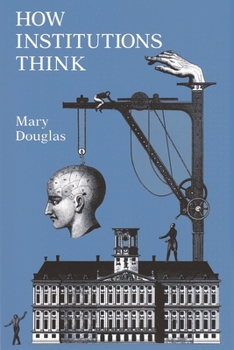How Institutions Think
Select Format
Select Condition 
Book Overview
Do institutions think? If so, how do they do it? Do they have minds of their own? If so, what thoughts occupy these suprapersonal minds? Mary Douglas delves into these questions as she lays the groundwork for a theory of institutions. Usually the human reasoning process is explained with a focus on the individual mind; her focus is on culture.
Using the works of Emile Durkheim and Ludwik Fleck as a foundation, How Institutions Think intends to clarify the extent to which thinking itself is dependent upon institutions. Different kinds of institutions allow individuals to think different kinds of thoughts and to respond to different emotions. It is just as difficult to explain how individualscome to share the categories of their thought as to explain how they ever manage to sink their private interests for a common good. Douglas forewarns us that institutions do not think independently, nor do they have purposes, nor can they build themselves. As we construct our institutions, we are squeezing each other's ideas into a common shape in order to prove their legitimacy by sheer numbers. She admonishes us not to take comfort in the thought that primitives may think through institutions, but moderns decide on important issues individually. Our legitimated institutions make major decisions, and these decisions always involve ethical principles.
Format:Paperback
Language:English
ISBN:0815602065
ISBN13:9780815602064
Release Date:June 1986
Publisher:Syracuse University Press
Length:158 Pages
Weight:0.54 lbs.
Dimensions:0.4" x 5.9" x 9.0"
Customer Reviews
2 ratings
We think alike
Published by Thriftbooks.com User , 17 years ago
All the people that without notice thinks alike it is because they are under the power of the institucion,we can not escape that way of thinking sothe chance to choice is a dream is not real.We are not as free as we believe.
A lighthouse in social science
Published by Thriftbooks.com User , 23 years ago
This book begins with a dilemma around a group of men, caught in a cave by falling rocks. Starved of food they have to decide whether cannibalism would be acceptable. Douglas argues that there is no universal solution to this dilemma and that the different possible outcomes depend on the instituional relationships among the individuals.Mary Douglas admits in the early chapters of the text that this is the book she should have written first. Many of her earlier books, including Purity and Danger and Natural Symbols attracted critical acclaim but failed to make her theoretical orientations explicit. Her approach is in a minority position in contemporary social science and is informed by the sociology of Durkheim as practiced in anthropology in the first half of this century. As with all of her books, HIT is a great pleasure to read and she illuminates critical academic concerns with in a voice that is engaging. The book was written as a response to Olson's 'Logic of Action' and so focuses on demonstrating the contrary position that collective action does have rational foundations. This is a short text which serves as a useful introduction. It is impossible to understand the breadth of Douglas' profound insights without also reading 'Implicit Meanings', 'Purity and Danger' and 'Risk and Blame'.






